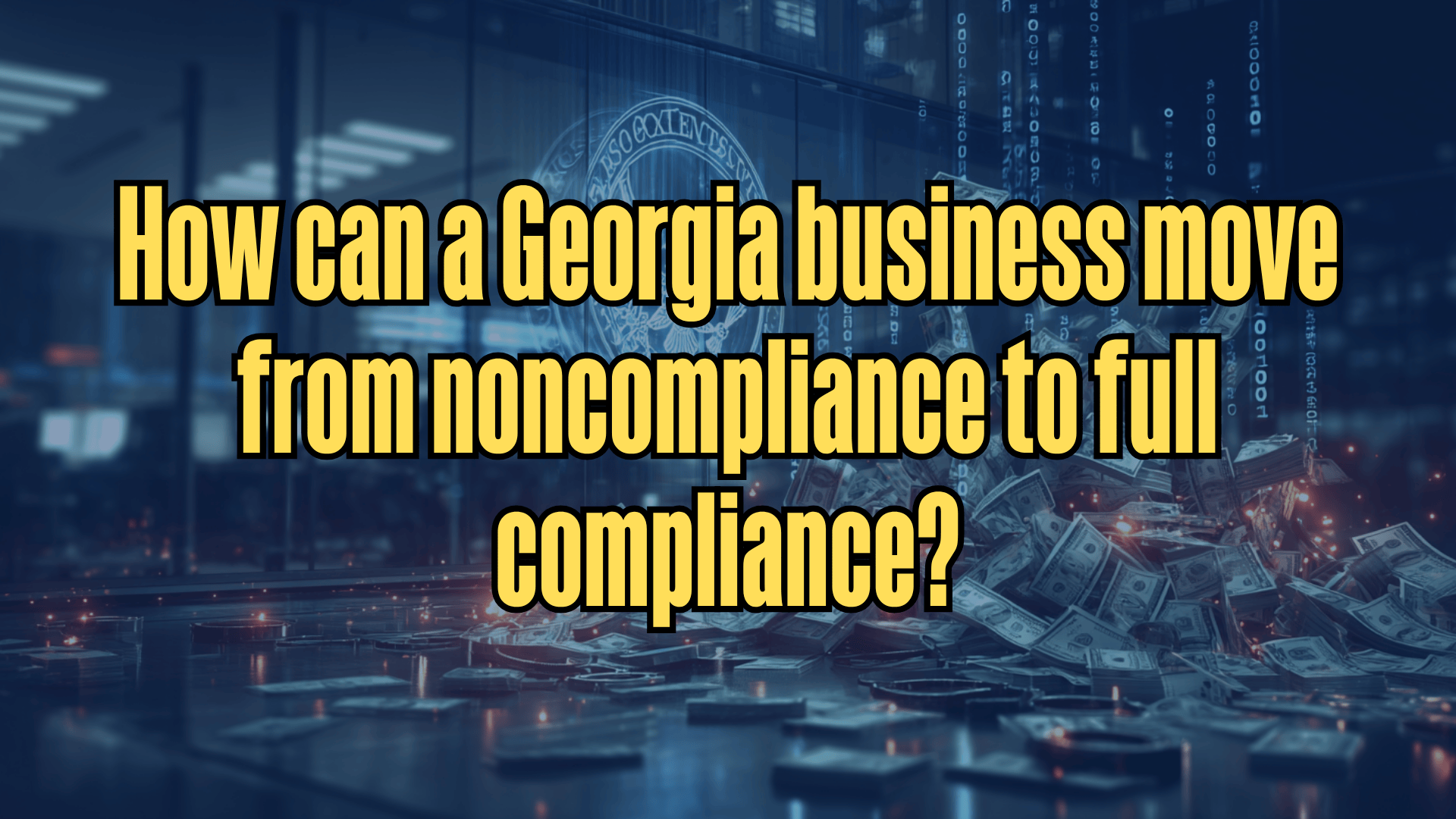For a Georgia-based business, transitioning from a state of non-compliance to full compliance is a critical journey, directly impacting its operational viability, creditworthiness, and eligibility for capital. Our deep dive into Secretary of State (SOS) data reveals the precise mechanisms and implications of this process.
Understanding the Landscape of Non-Compliance in Georgia
First, it's essential to pinpoint the specific facets of non-compliance that a Georgia business might face. The Georgia Secretary of State (SOS) delineates several statuses that indicate a departure from full regulatory adherence:
- Noncompliance/Nonpayment: This status signifies that the entity is not in good standing, typically due to a failure to comply with certain requirements, such as paying fees or filing necessary documents.
- For lenders, a "Noncompliance/Nonpayment" flag raises immediate concerns about the business's financial management and its commitment to legal obligations, signaling increased risk. Such entities demand closer scrutiny of their overall financial health and operational stability before any lending decisions can be made.
- This status directly impacts a business's ability to access competitive financing, as lenders prioritize entities demonstrating sound administrative and financial practices. Without rectifying this, a business remains a high-risk proposition, limiting its growth potential.
- Leveraging an SOS API like Cobalt Intelligence allows lenders to instantly identify this specific non-compliance, enabling rapid risk assessment and preventing manual, time-consuming investigations into questionable applications.
- Active/Noncompliance: Indicating that the entity is operational but not fully compliant with state requirements, putting its good standing at risk.
- While still functioning, this status suggests underlying management or financial issues that could escalate, requiring lenders to carefully assess the specific non-compliance factors and their potential impact on the business's stability. This presents a nuanced risk, where the business is active but fundamentally unstable.
- For a business, operating in "Active/Noncompliance" is a precarious position; it might attract initial lending interest due to perceived activity but will quickly encounter stringent due diligence, demanding transparency on its compliance roadmap. Failure to address this could lead to harsher statuses like "Admin. Dissolved" or "Revoked".
- Real-time data from a robust SOS API allows lenders to immediately distinguish between a fully compliant "Active" business and one operating under a cloud of "Active/Noncompliance," ensuring accurate risk profiling even when a business attempts to appear stable on the surface.
- Admin. Dissolved: This critical status means the entity has been administratively dissolved by the state due to a failure to meet legal obligations, such as filing required reports or paying fees.
- Lenders should exercise extreme caution with these entities, as administrative dissolution often indicates severe financial difficulties or management issues that fundamentally impact loan repayment ability. The legal standing of the business is severely compromised.
- A business in this state has lost its authority to conduct legal operations, including entering into new contracts or securing financing. Reinstatement is possible but requires significant corrective action and demonstrates past operational neglect.
- Automated SOS API checks provide an instant red flag for "Admin. Dissolved" entities, allowing lenders to automatically decline high-risk applications and avoid lending to businesses that fundamentally lack legal operational capacity, significantly reducing fraud exposure.
- Revoked: This signifies that the entity's registration has been revoked by the state, often due to serious or repeated non-compliance, meaning it is no longer legally allowed to operate.
- Lenders should completely avoid extending credit to revoked entities, as they lack legal standing and may face significant challenges in resuming operations or generating revenue. This is typically a final, severe consequence of sustained non-compliance.
- For the business, "Revoked" status implies a fundamental breakdown in its relationship with state regulators, signaling deep-seated issues that undermine its very existence and any prospects for legal business activity.
- By integrating real-time SOS data, lending platforms can automatically screen for "Revoked" statuses, ensuring that capital is never deployed to entities that are legally unable to conduct business, thereby fortifying underwriting models against significant regulatory and financial risk.
The Path to Rectification: Addressing Core Deficiencies
The clearest path for a Georgia business to move from non-compliance to full compliance is encapsulated by the "Redeemed" status: "The entity has rectified previous non-compliance issues and has been restored to good standing". This implies a direct and proactive approach to addressing the specific administrative and legal failures that led to the non-compliant status.
- Strategic Rectification of Filings and Fees: The most common reasons for non-compliance, such as "Noncompliance/Nonpayment" or "Admin. Dissolved," often stem from a failure to file required reports or pay outstanding fees. The primary step is to identify all overdue filings (e.g., annual reports) and outstanding financial obligations to the Georgia Secretary of State and promptly submit them.
- For institutional lenders, advising a non-compliant borrower on this clear path to rectification can transform a high-risk prospect into a viable one, contingent on proven commitment to administrative hygiene. This signals a proactive approach to risk management, showcasing a path to potential future funding.
- Emphasizing the importance of digital tools and automation for ongoing compliance can prevent future lapses. Automated reminders for filing deadlines and payment obligations can be integrated into a business's operational tech stack, ensuring continuous adherence.
- This process, while seemingly simple, can be complex if multiple years of non-compliance have accumulated, often requiring back-filing and payment of penalties in addition to original fees.
- Ensuring Valid Registered Agent Information: While not explicitly detailed for Georgia in all non-compliance statuses, a failure to maintain a registered agent is a common trigger for adverse statuses in many states, including "Admin Diss/Cancel - Agent" in Missouri. The registered agent is the legal point of contact for the state, essential for receiving official communications.
- Lenders recognize that a valid and accessible registered agent is foundational to a business's legal operability. Any lapse here signals poor administrative oversight and increases risk, as critical communications from the state might be missed.
- Businesses should regularly verify their registered agent information with the SOS and ensure it is up-to-date. Changing registered agents without proper notification can lead to a lapse in compliance.
- Cobalt Intelligence's API can specifically verify Registered Agent data, streamlining a critical aspect of due diligence for alternative lenders by confirming the legitimacy and contactability of a business.
- Proactive Compliance Monitoring and Remediation: Moving from non-compliance to full compliance isn't a one-time fix but an ongoing commitment. Businesses must implement internal processes to track and manage their state filing requirements proactively.
- For lenders, a robust compliance framework within a borrower's operations translates directly to reduced credit risk. This includes regular internal audits of compliance status and a defined remediation plan for any identified issues.
- Leveraging AI-powered tools and APIs for continuous monitoring of business data, including SOS records, can prevent a relapse into non-compliance by providing real-time alerts on potential issues or upcoming deadlines.
- Automated solutions can turn what was once a "500-hour manual task into instantaneous data retrieval," significantly reducing operational overhead and ensuring perpetual good standing.
Achieving "Redeemed" Status: The Return to Good Standing
The ultimate goal for a Georgia business addressing its non-compliance is to achieve "Redeemed" status, signifying that it has "rectified previous non-compliance issues and has been restored to good standing".
- Reaffirmation of Operational and Legal Standing: A "Redeemed" status means the business has regained its full legal authority to operate within Georgia, having satisfied all outstanding requirements. This is a powerful signal of renewed commitment to regulatory adherence.
- For alternative business lenders, a "Redeemed" status significantly lowers the perceived risk profile of a previously non-compliant entity. It indicates a business capable of self-correction and a renewed path to financial responsibility, opening doors to more favorable lending terms.
- Businesses achieving this status demonstrate improved governance and internal controls, making them more attractive not only to lenders but also to potential partners and investors. It reflects a maturity in managing legal obligations.
- This transition allows the business to once again qualify for competitive offers from funders, as key lending milestones often depend on years in good standing.
- Continued Due Diligence and Historical Context: While "Redeemed" is a positive indicator, lenders should still investigate the nature of the previous non-compliance and ensure that the business has fully addressed any underlying issues that led to the initial problems.
- This due diligence helps lenders differentiate between a minor administrative oversight and a pattern of systemic financial or management distress, allowing for a more nuanced risk assessment even after remediation.
- Integrating comprehensive business verification tools that provide historical filings and amendments can offer this critical context, allowing lenders to see the full compliance journey, not just the current snapshot.
- A strong value proposition for any lending platform is the ability to not just verify current status but also track a business's compliance history, providing predictive insights into future stability.
- Sustaining Compliance through Continuous Monitoring: To ensure sustained good standing, a Georgia business must embrace a culture of continuous compliance. This involves ongoing vigilance and leveraging technology to monitor its status in real-time.
- Lenders benefit immensely from borrowers who proactively manage their compliance. Platforms that require or encourage real-time data integration for ongoing business verification reduce their portfolio risk and can offer better terms based on demonstrable, sustained compliance.
- Implementing an API-driven solution, like Cobalt Intelligence's Secretary of State API, allows businesses to automate thousands of SOS lookups, monitor their own compliance status proactively, and receive alerts if any issues arise, thereby preventing a return to non-compliance.
- This automation frees up internal resources, allowing businesses to focus on core operations and growth rather than manual compliance checks, translating directly into a more efficient and reliable lending partnership.
By understanding these statuses, proactively addressing underlying issues, and leveraging advanced fintech solutions, a Georgia business can effectively navigate the path from non-compliance to a sustained state of full compliance, positioning itself as a stronger, more reliable borrower in the eyes of alternative business lenders and institutional lending executives.












.png)